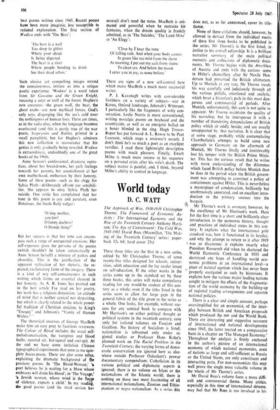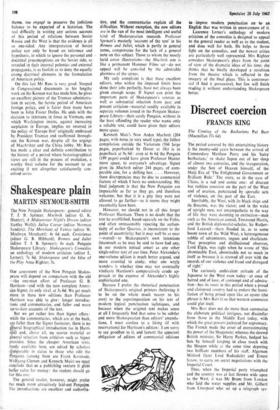World today
D. C. WATT
The Approach of War, 1938-1939 Christopher Thorne; The Framework of EConomic Ac- tivity : The International Economy and the Rise of the Twentieth Century Anthony Harri- son; The Age of Containment : The Cold War, 1945-1965 David Rees (Macmillan, 'The Mak- ing of the Twentieth Century' series : paper- back 12s 6d; hard cover 25s) These three titles are the first in a new series, edited by Mr Christopher Thorne, of some twenty-five titles designed for schools, univer- sities, adult education and the lay reader intent on self-education. If the other works in the series come up to the standard set by these three books, this series will make compulsory reading for any would-be student of this cen- tury as a whole; even if the titles listed in the series seem to allow for large gaps in the general fabric of the title given to the series as a whole. One looks, for example, without suc- cess for any seminal book to compare with Mr Harrison's on either political thought or political systems in the twentieth century, save only for isolated volumes on Fascism and Gaullism. No history of Socialism is listed; nationalism is subsumed only under re- gional studies or Professor Hans Kohn's planned work on The Racial Problem in the Twentieth Century; the varying forms of demo- cratic conservatism are ignored here as else- where outside Professor Oakeshott's prewar documentary compendium; Catholicism in its various political and diplomatic aspects is ignored; there is no volume on Islam or the nationalisms of the Islamic world; there is nothing on those two most fascinating of all international nationalisms, Zionism and Ethio- pianism or negro nationalism. As a series this does not, as so far announced, cover its title- theme.
None of these criticisms should, however, be allowed to detract from the individual merits of these first three books to be published in the series. Mr Thorne's is the first listed, in justice to his overall editorship. It is a brilliant narrative summary of the main political memoirs and collections of diplomatic docu- ments. Mr Thorne begins with the Anschluss of Austria and ends with the curious scene in Hitler's chancellery after Sir Nevile Hen- derson had presented the British ultimatum. Up to Munich at any rate, Mr Thorne treads his way carefully and judiciously through all the various pitfalls, emotional and analytic, which beset a historian's path in this most dan- gerous and controversial of periods. After Munich, unfortunately, this care is not quite so apparent. Mr Thorne maintains the quality of his narrative; but he intersperses it with a number of thundering denunciations of British policy which sit oddly beside, and are usually unsupported by. that narrative. It is clear that at some stage, probably while contemplating Chamberlain's attempts to build some new approach to Germany on the aftermath of Munich, Mr Thorne finally and irretrievably lost his temper with the British Prime Minis- ter. This has the curious result that he writes with more understanding of the dilemmas which faced British policy before Munich than he does in the period when the British govern- ment was attempting to construct a policy of containment against Hitler. This is nevertheless a masterpiece of condensation, brilliantly but unobtrusively annotated, and an excellent intro- duction to the primary sources into the bargain.
Mr Thorne's work is overcast, however, by the excellence of Mr Harrison's work. Here for the first time is a short and brilliantly clear introduction to the economic history, thought and practices of individual states in this cen- tury. It explains what the international gold standard was, how it functioned in its heyday, and why the attempt to return to it after 1919 s, was so disastrous; it explains exactly what President Roosevelt did when he shattered the World Economic Conference in 1933 and destroyed any hope of handling world eco- nomic problems at an international level—a piece of natural egotism which has never been properly castigated as such by historians. It explains how the various major leading nations sought to mitigate the effects of the fragmenta- tion of the world economy by the building-up of regional trading arrangements and separate national policies.
There is a clear and simple account, perhaps oversimplified for an economist, of the inter- play between British and American proposals which produced the IMF and the World Bank. There are interesting and suggestive accounts of international and national developments since 1945, the latter treated on a comparative basis in a chapter on The Managed Economy.' _Throughout the analysis is firmly anchored in the author's picture of an international economy of which national economies, even of nations as large and self-sufficient as Russia or the United States, are only constituent and interacting parts. For non-economists this may well prove the single most valuable volume in the whole of Mr Thorne's series.
Mr David Rees's volume faces a more diffi- cult and controversial theme. Many critics, especially in this time of international d6tente, may feel that Mr Rees is too involved in his
theme, too engage to preserve the judicious balance to be expected of a historian. The real difficulty in writing any serious account of this period of relations between Soviet Russia and the West is that the evidence is all so one-sided. Any interpretation of Soviet policy can only be based on inference and hypothesis, in which to ignore the personal and doctrinal preconceptions on the Soviet side, as revealed in their internal polemics and external propaganda, is as foolish as to deny the equally strong doctrinal elements in the formulation of American policy.
On this last Mr Rees is very good. Steeped in Congressional documents as his lengthy work on the Korean war has made him, he gives an excellent picture of the Truman administra- tion in action, the heroic period of American foreign policy, and is fairer than many have been to John Foster Dulles. He ends with the decision to intervene in force in Vietnam, one which Washington insists, against increasing scepticism in Europe, implies no reversal in the policy of 'Europe first' originally embraced by President Truman and reaffirmed through- out the Korean war, despite all the urgings of MacArthur and the China lobby. Mr Rees has made a clear and definite contribution to the history of a period where historiographical views are still in the process of evolution, a worthy final volume for the moment to an exciting if not altogether satisfactorily con- ceived series.































 Previous page
Previous page